140 Search Results for schedules
October 31, 2022
by Carole Zangari -
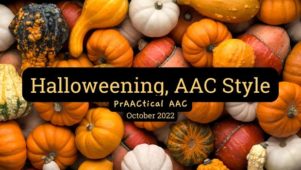
Happy Pumpkin Day! We’re reprising this post for anyone in need of some additional resources. Holidays are special and Halloween is a favorite among many. As much fun as it is to dress up and get candy, though, there are lots of ways that Halloween can be stressful for AAC learners. From the change in routine, to the costumes and scary decorations, to talking with neighbors and other less familiar communication partners, to the overabundance of sugar, there are lots of ways in which Halloween can trip us up. If the AAC learners in your life celebrate Halloween, Fall Festival, Harvest Parade, or any other celebration with similar traditions, we SLPs can help them to have a positive experience. Here are some ideas. Use a social narrative to prepare everyone for what to expect on and around Halloween. Read them often in the weeks leading up to the school dress-up parade,... [Read More...]
June 2, 2022
by Carole Zangari -
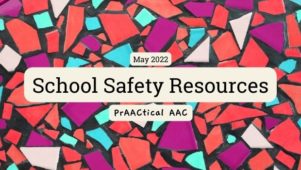
Here in the US, we celebrated Memorial Day on Monday, a time for remembering those who died in military service to our country. While we honor them and their tremendous sacrifices, it’s impossible not to be reminded of the tragic shooting that recently took the lives of so many elementary school children and their teachers. As we move through our grief we also start thinking of the practical aspects of helping children with AAC needs become better prepared for emergency situations in schools. We’ve updated these resources in hopes that they may be helpful to some of you. :::::::::::::::::::::::::::::::::::::::::::::::::::::::::::::::::::::::: Recent events, such as the horrific mass shooting at Robb Elementary School, have led us all to re-examine policies and procedures that impact school safety. Throughout the country, school communities are re-evaluating and fine-tuning their processes for keeping students and staff safe in the unlikely event of violent acts, such as... [Read More...]
February 6, 2022
by Carole Zangari -
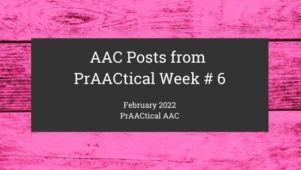
Happy Sunday, AAC friends. Here are some posts you might enjoy. Monday – 3 Ways to Use Visual Schedules to Enhance AAC Learning Tuesday – AAC Link Up Wednesday – Video of the Week: AAC Do’s & Don’ts Thursday – Throwback Thursday: AAC-friendly Valentine’s Day Resources Friday – PráctiCAAmente Conectados Con Links – Febrero 2022 :::::::::::::::::::::::::::::::::::::::::::::::::::::::::::::::::::::::::::::::::::::::::::::::::::::::::: In the mood for a little more AAC reading? Here are some suggestions. Getting ready for a core vocabulary journey Make It Monday: Manual communication boards with core vocabulary Make It Monday: More words, please! Expanding our manual communication boards Super Size It: 5 ideas for making large communication boards Beyond requesting: A week of routines to increase AAC use at mealtimes 5 ways to build understanding Free resources for making AAC and visual supports 5 places for shared AAC materials
January 6, 2022
by Carole Zangari -
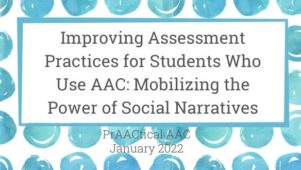
Social narratives are an empirically supported intervention that can be helpful in supporting people with AAC needs. They are commonly used to help individuals with autism understand and deal with challenging situations such as fire drills, birthday parties, and trips to the dentist. All types of social narratives can be written in text alone or include pictures and illustrations. Social Stories are a particular kind of social narrative that have a specific set of guidelines for their development and use. The originator of Social Stories, Carol Gray, defines Social Stories this way: “A Social Story accurately describes a context, skill, achievement, or concept according to 10 defining criteria. These criteria guide Story research, development, and implementation to ensure an overall patient and supportive quality, and a format, ‘voice’, content, and learning experience that is descriptive, meaningful, respectful, and physically, socially, and emotionally safe for the Story audience (a child, adolescent,... [Read More...]
September 20, 2021
by Carole Zangari -
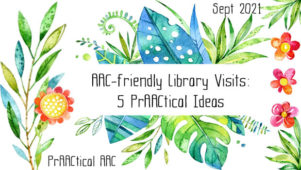
The community of AAC practitioners and families includes many people who have strong connections to their school or community libraries. In today’s post, we share some thoughts and resources on making library visits more accessible and engaging to those with AAC needs. Social narratives are a wonderful, evidence-based way to help AAC learners prepare for the experience of visiting the library. These work best when the pictures and text are customized to fit the specific library situation that the AAC learner will encounter. Here are some examples. Nicole Caldwell’s example of a social narrative Lancaster Public Library Social Narrative for Children Social Narrative for Teens Take a video tour of the library, like this one from Powell River Library. If your local library doesn’t have an online video tour, suggest that they create one or, if you’re feeling ambitious, create your own. Create a visual schedule or picture checklist for... [Read More...]
September 2, 2021
by Carole Zangari -
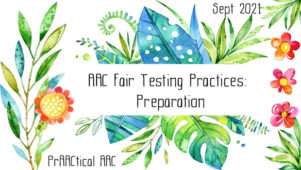
In an earlier post, we talked about the difficulties that people who use AAC experience when they have to participate in tests or other assessments for educational or therapeutic purposes. (You can see that post here.) One approach to addressing these challenges is for key stakeholders to come together and develop a set of guidelines that teachers, therapists, and others can use when they need to administer an assessment. Today, we’ll look at some of the guiding questions that teams can use to develop these Fair Testing Practices. The idea here is that AAC users, families, professionals, and other team members can come together to discuss a number of specific issues regarding preparation, materials, means of answering questions, etc. Later in the series, we’ll talk about ways to facilitate meaningful participation by individuals who use AAC but are still developing their communication and language skills. For the time being, though,... [Read More...]
November 9, 2020
by Carole Zangari -
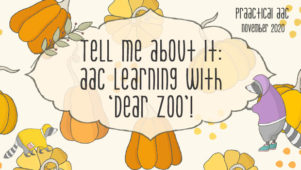
Ready for another post with book-related ideas for supporting core vocabulary learning in preschool classrooms? We’re excited to welcome Jeanna Antrim and Maggie Judson back to these pages with another guest post the TELL ME About It series. Today, they share ideas for core vocabulary experiences with an old favorite, Dear Zoo.If you’re in search of ways to support preschool teachers who are implementing the TELL ME program with their young students, this post is for you. There are quite a few resource links embedded in this post, ready for you to download. Maggie and Jeanna are speech-language pathologists who work in the Assistive Technology Department for the Belleville Area Special Services Cooperative (BASSC) in southern Illinois. They are AT/AAC facilitators and provide evaluations, direct therapy, consultations, and trainings with school teams. ::::::::::::::::::::::::::::::::::::::::::::::::::::::::::::::::::::::::::::::::::::::::::::::::::: TELL ME About It: AAC Learning with ‘Dear Zoo’! TELL ME About The Book The third book... [Read More...]
August 29, 2020
by Carole Zangari -
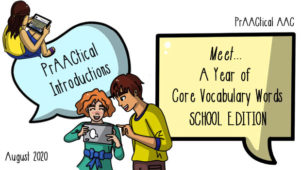
Much has changed since we first wrote about the Year of Core Vocabulary Words and began publishing monthly word lists, symbol cards, activity ideas, and book suggestions. It is gratifying to see the concept and these resources being used by teachers, clinicians, and parents. Today, we introduce an expansion of that concept with a specific focus on school-based AAC support. Say hello to the School Year of Core Words series. Conceptualized and created by AAC SLP Michaela Sullivan, and two pre-professional SLP students, Beth Lytle and Alisa Lego, the series begins with this introduction to the Level 1 and Level 2 words, and some information about what to expect as the series progresses. It will be followed by monthly posts with ideas, resources, and materials. The series follows a US academic calendar, running from August through June. You can learn more about the School Year of Core Word series creators,... [Read More...]
August 19, 2020
by Carole Zangari -
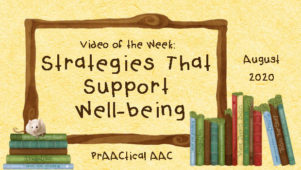
How can we help families cultivate well-being in these challenging times? In today’s featured video, Dr. Brenda Smith Myles shares tips for making space in our daily routines for structure, schedules, activities, mindfulness and patience, sleep routines, and other supportive strategies. Many thanks to Dr. Myles and the Kansas Technical Assistance System Network (TASN) for creating and sharing this video. Click on the image below to start watching. Direct Link to Video – https://vimeo.com/428624586
August 13, 2020
by Carole Zangari -
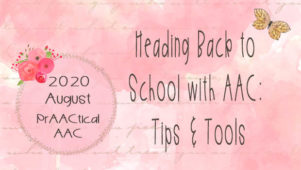
Here in the US, millions of teachers, therapists, families, and students are planning to return to school, whether virtually, in person, or with some combination of the two. No matter what the format for instruction, one of the most important things for students who use AAC is having their SLPs, teachers, and families on the same page. They each have a different but very intense relationship with the student’s AAC system. Today, we reprise a popular post with some prAACtical thoughts on getting everyone pointed in the same direction. 1. Develop a communication profile of the student: In the initial weeks, try to get a baseline of how the student is communicating at the start of the year. For beginning communicators, we track things like their communicative intents (WHY they are communicating), modalities (HOW they are communicating), and the frequency of their communication. We’ve written about one of our favorite... [Read More...]









